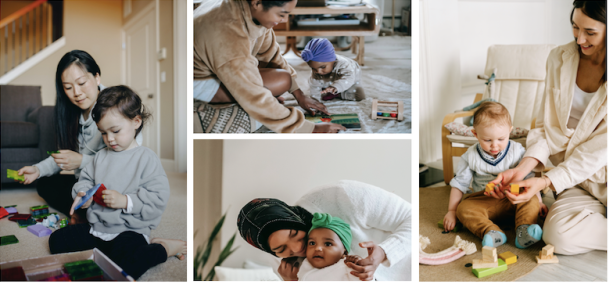Project NeuroSync

Project NeuroSync is a newly funded research project in the Infant and Toddler Lab in the School of Psychology at the University of Nottingham.
It is run by a multi-disciplinary team of psychology researchers and neuroscientists interested in child development. In this project, we are interested in how babies respond to, learn to interact with and eventually, ‘fall into sync’ with their mothers. To this end, we will use experimental games, brain scanning equipment, head-mounted cameras and questionnaires to understand how babies ‘fall into sync’ with their mothers.
To participate in our study, please email or phone us
To keep up with updates and news from our project, you can follow us on:
How do we ‘fall into sync’ with one another?
Research has shown that when two adults or an infant and their parent jointly engage in a task, the same brain areas start to work together during moments of co-operation and do not work together during moments of competition or conflict – collectively, referred to as brain-to-brain synchrony. However, it is still unclear why these brain areas might sync with each other and how this synchrony develops over time. We are interested in understanding this fascinating phenomenon through the lens of cognitive function. Critically, we ask whether synchrony begins with the synchrony of brain networks underlying a critical cognitive system, visual working memory. Visual working memory is responsible for detecting, maintaining, and updating changes of representations in the world around us. It is also a pervasive cognitive system that begins is measurable as early as four months of age, continues to develop into adulthood and is predictive of academic abilities and intelligence in children.
What impact is this project expected to have?
It will provide critical insight to current theoretical underpinnings of brain-to-brain synchrony by, for the first time, focussing on the modulation of a specific cognitive system in mothers and infants. Further, it will directly address how the quality of interactions between mothers and babies can impact cognitive development in babies in the first few critical years of life. We hope that these findings can be used to develop and foster integral developmental milestones for healthy behaviour and brain development in children.
Partner Universities
University of Nottingham

University of Sterling

University of East Anglia

Funding partners
Leverhulme Trust
Bill & Melinda Gates Foundation
Meet the team
Dr. Sobana Wijeakumar
University of Nottingham

Dr. Wijeakumar is the Research Lead and Principal Investigator on Project NeuroSync. She is an Assistant Professor at the University of Nottingham and an Honorary Lecturer at the University of Stirling. Dr Wijeakumar’s research seeks to understand the developmental trajectory of visual working memory and inhibitory control across the lifespan – particularly in infancy and early childhood and older adults. Click here to find out more about Dr. Wijeakumar’s research.
Dr. Line Caes
University of Stirling

Dr. Caes is a co-investigator on Project NeuroSync. She is a lecturer at the University of Stirling . Dr. Caes’s research seeks to understand parent-child interactions in the context of typical and atypical child pain experiences. Click here to find out more about Dr. Caes’s research.
Dr Sarah Cassidy
University of Nottingham

Dr. Cassidy is a collaborator on Project NeuroSync. She is an Associate Professor at the University of Nottingham. Dr Cassidy’s research focus is on Mental Health and Autism. Click here to find out more about Dr. Cassidy’s research.
Prof. John Spencer
University of East Anglia

Prof. Spencer is a Consultant on Project NeuroSync. He is a Professor of Psychology at the University of East Anglia . Professor Spencer’s research seeks to examine the development of executive functions including working memory, attention, and inhibitory control. Click here to find out more about Prof. Spencer’s research.
PhD Students
Christina Davidson
University of Nottingham

Christina’s research focus will examine how the mothers executive function and interactions influences their babies’ cognitive and behavioural development across the first few years of life.
Ghada Amaireh
University of Nottingham

Ghada’s research focus will examine how mothers’ daily executive function abilities is linked to socio-emotional and brain-to-brain synchrony during interactions they have with their babies.
Aimee Theyer
University of Nottingham

Aimee’s research focus will examine how babies’ visual working memory function is impacted by explorative looking behaviour, socio-emotional synchrony and brain-to-brain synchrony during interactions between mothers and babies during the first few years of life.